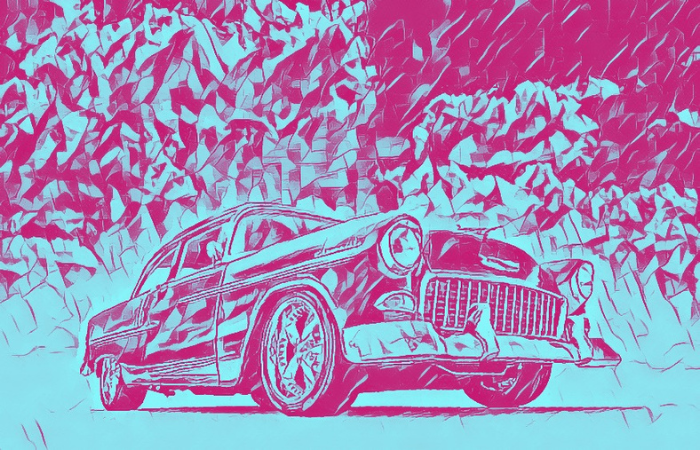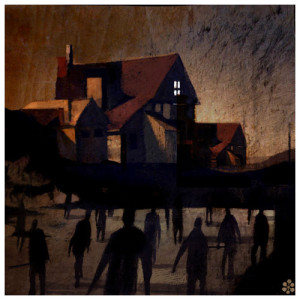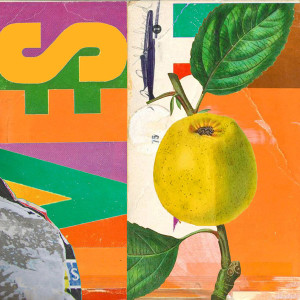Angie was the type of car people kept in antique store backyards ‘cause they thought she looked cool, “There ain’t nothing like a Classic Chevy.” My dad had a thing for cars so he bought her for a grand and put the rest of his cash into fixing her up. He did it until he died, lung cancer, and then Angelica was mine.
She’s orange, but in a pink way. Doesn’t look right in parking lots, like a mangled scoop of peach ice cream. Stick. You have to punch the clutch two times to shift, but other than that easy enough. Crank windows. Cigarette lighter. Radio’s broken.
Drives real good though. She took me all the way to Ohio then finally tore herself apart in a clearing near Dayton. Somehow, I’d run her over a bottle a-ways back and thought the bumping was just the road. Her tire was shot, and so were the axles, and that night she told me, “Lennon, every once in a while, you just know it’s just your time. I love you.”
So I left the keys in the ignition and headlights on the horizon. I don’t remember crying, but when I look back at the pages of the atlas I was following that night, they’re obviously warped by tears.
My name is Lennon like the Beatle. I don’t sing and I don’t play piano. I have never married so I have never cheated on my wife. I have no musical talent but I know how to drive stick which is pretty cool according to the kids around here.
Bonnie says I have an accent. She’s missing a toenail and bought a pet snake without a name. I like to call him Bennet but she thinks that’s all wrong. “You’ve gotta leave room for him to breathe, room to grow.”
It seems like Bennet’s growing just fine. Bonnie’s got him cooped up in an action packer with holes in the top and a heating pad underneath. She swears he doesn’t need more space, but I like to let him out when she’s not home. I watch as he weaves through her art supplies, wraps himself around the post of her sun lamp, curls up in a pile of her dirty clothes. When one of us is upset, Bonnie scoops him out of his box and guides him around our waists, chanting “Hug, hug.” It’s touching, but I don’t understand why she can’t just do it herself.
There are two Nates. The first goes by Nate, and so does the second. One of them visits his parents on the weekends and the other is obsessed with tea. Every morning I awake to the smell of earl gray, and every night he crawls onto my mattress, sits criss-crossed at the far corner, and passes me a warm cup of chamomile. I don’t have the heart to tell him I hate tea so I say it’s too hot and I’ll drink it later, then pour it into the sink when he’s gone. Other Nate doesn’t get one ‘cause he works the graveyard shift.
We live in an apartment with three rooms. There used to be one for each of them, but then I moved in and screwed the organization. I live with Nate, not-tea-Nate-yes-parents-Nate, because he’s gone on the weekends and a lot of the nights. When he’s here, I watch him toss and turn in bed, doing all he can to avoid the creeping beam of light that enters through our uncurtained window. When he’s gone I teach myself songs on his guitar, or press flowers to add to the empty walls.
Dad made me a book which starred Princess Lennon for my seventh birthday. It was shoddy-bound by kitchen twine, but had a cover made of real leather. He told me he was proud of me for reading so well, then had me go through the entire thing right then and there.
Dad had bad eyesight, so he liked it when I read aloud. Every morning he’d ask for the headlines. When he heard a good one he’d hold up his hand then pull the story out of my mouth. Normally, he only cared about the day’s tragedy and the baseball scores, but sometimes there were particularly compelling issues, so he’d have me read every section.
I think my teachers had a crush on him because on the days he had me read so much I was more than an hour late to school, they let him march into the classroom on the condition he educated us kids on current events. My classmates loved my dad because he took his time, cancelling math for the day.
It was sundown when I left Angelica, and it got dark fast. I walked on the shoulder and listened to the sudden surge then release of the wind when each car passed. Did some math and figured I’d only be on the road another hour before I reached Morrow and found a hotel, so my pace was optimistic. I swatted mosquitoes. I hummed church songs I didn’t believe in. I adjusted the straps of my backpack so it sat on my ass, bounced when I walked.
You know how teenagers like to cram as many people possible into their tiny little sedans? It’s the opposite in Ohio. When Bonnie put her hazards on then pulled over half a mile in front of me, three cars behind her did the same. I expected at least a dozen people from their caravan. There were five.
“You’re alone,” tea-Nate said, but I didn’t say anything back because it was mainly men and Dad said avoid groups of men at all costs. But Bonnie wasn’t a man so she told them to fuck off then asked if that was my car all steamy and vintage back there and if I liked snakes and when I told her go away she shrugged her shoulders and pulled a pen out of her jacket pocket.
Grabbed my arm, wrote her number on it, then took off, the rest of the gang behind her. I decided to call two days later once my money ran out and the motel said they couldn’t keep me anymore.
My mom died before I can remember. Dad liked to tell me about her, spent a lot of his time doing it. Her favorite flower was a marigold, and if she could have done anything with her life she would’ve been a singer. Instead, she settled on graphic design.
I never saw my father cry. About her at least. I asked him about it once, and he said I cried enough for the both of them when she was gone.
I said, “I was a baby.”
He said, “And a loud one, too.”
My dad bought me flowers frequently. Once a month at least. All sorts of arrangements—I don’t know how he could afford it. Never marigolds, though. Not like they’re common in bouquets or anything, but still. I didn’t meet my mom so I didn’t feel it, but my dad says that her absence became her presence. It was something he could feel missing, which meant it was something he could feel, which meant it was something. Bring back the marigolds and maybe she’d go away.
“When my Dad died,” I say to parent-Nate, “I wished I’d hung out with him more.”
Bonnie was making fun of him for how often he was gone. She wondered if his folks still picked out clothes for him, or folded his laundry.
“When mine died I said good riddance,” Nate (the tea one) shouts from his room. It’s something we argue about. He says the sooner your parents are gone the sooner you’re free. I think you get free whether they’re there or not.
“Thanks,” parent-Nate says, then returns to packing his bag. He’s bringing them hot chocolate, much to Nate’s disapproval (“hot cocoa is an insult to Toasted Nut Brûlée”), as celebration of their thirtieth wedding anniversary. As much as Bonnie gives Nate flack, we all know she wants to be just like his parents. One day she’ll have a kid who visits her every weekend.
I read the paper every morning which is stupid because I have to pay for it and could get my news online for free. It’s just that I like the obituaries in print.
My dad didn’t want one. He said they always had too many exclamation points. “Death is sad. I want mine to be sad, too. You can remember the good stuff after you’ve coped with me being gone. No need to preemptively shove it into a column,” but I wrote one for him anyway. It wasn’t any good so I never sent it in, but I still have it tucked into the glovebox of my car.
I had it tucked into the glovebox of my car.
Sometimes, Bonnie drives past the spot Angie broke down, and I’m always shocked to see she isn’t there. I don’t know what I expected, but I think a part of me hoped she had to live forever, that her headlights would never drink her battery dry, that no one would dissect her for parts.
She’s got a ghost on that road, like every time I’m almost asleep any my eyelids are twitching in the passenger seat I see that not-orange-orange-but-pink-orange shell sputtering by. The first times it happened, I’d jolt awake, but now I know well enough to let myself doze off.
“It’s just confidence, Babydoll. That’s all,” he’d say.
I’m crying in the driver seat of this beat up car for two reasons. The first is that it’s fucking ugly and Dad could have just bought me something functional and pretty but instead he had to put my college fund into this hunk of crap, and the second is that I can’t even drive it.
“Double clutch, slow release slow pressure. Take it step by step.”
I do. Double clutch, slow release, slow pressure on the gas. I kill the car.
“Jesus fucking Christ!” I scream and pound the steering wheel. Tears start to gather in the corner of my eye. At this point, the birds are no longer afraid of the horn. “Watch your language. Let’s try again.”
“Why do you miss your dad?” Nate, tea-Nate-who-has-dead-dad-Nate, asks me. He is holding his mug with both hands. I’m holding mine with my thighs. The corduroy of my pants keeps from scalding myself.
“I don’t,” I say, which is mostly true.
“But you talk about him so often.”
“I love him.” This is normally how the conversation ends.
“Lennon, I love my dad too, and I miss him, but I don’t talk about him ever,” Nate says.
“That’s because he was mean to you.”
Nate rolls his eyes.
“It’s easier to love him, or to miss him, and it’s almost impossible to do either of those when you’re remembering all the stuff he did. It’s easier to remember when you talk about him. It only makes sense that to forget you don’t.”
He blows on his tea, slow. “But one day I’m going to forget all of him.” “I hope so. Then you’ll have only the good parts left.”
Bonnie’s snake went missing last Tuesday. The first night, we laid out a nice heap of blankets next to her space heater hoping the winter outside would corral him to it. No luck. Bonnie figured he’d found his way back but left when the sun came up. So the next night she made us stand guard, taking a six hour shift each. He didn’t show.
I read up on snakes who run away. They like dark warm places—behind refrigerators, inside your printer, boiler rooms—but we can’t find him anywhere. Bonnie says she’s fine, that she’s not bothered that he left her and might die, but she has begun to refer to him as Bennet.
Nate and I, over our nightly teas, decided we should hold a funeral. “It’s gotta be one of those viking ones. A send-off of some sort. Better than anything we’ve ever seen before.” Bonnie thinks it’s stupid, but I know it’ll help.
Tomorrow, we will wake at dawn. Bonnie will make one last sweep, then wad up the blankets and throw them into the corner and make a mental note to purchase a laundry bin. She will turn off the space heater and walk a little bit behind Nate and I, who are side by side. Nate will drive home early and meet us at the Walmart. We’ll light a candle and make a paper boat, then send it bobbing down the drainage pit between the parking lot and the highway.
When it floats into the giant tube at the end, the candle will be blown out by the wind, and Bonnie might cry, just this once.
Angelica (1954-2013)
Nobody knows where she came from, but they figure she was manufactured in the Toronto facility then shipped to Chicago. It is presumed she lived a hard life, those first ten years, and was then abandoned at the home of an up-and-coming fixer-upper, who thought he might be able to repair Angelica for his parents; they had owned a 55’ when they were teenagers. Unfortunately, said fixer died shortly thereafter of a surprise heart attack. Angelica, now known as Angie, was left to rust until twenty years later when she was auctioned for parts in northern Alabama.
After that, she traveled from person to person and eventually crossed into Georgia, where she lived for five years in the backyard of an antique store. Paul Scott was nearly forty and grieving the loss of his wife, Haley, when he came across Angelica. It was love at first sight.
Paul decided right then and there to dedicate the rest of his life to Angie’s happiness. That is exactly what he did. When Paul died of lung cancer in 2013, Angelica was heartbroken. She straddled the line between her own desire to join him and her responsibility to take care of his only surviving relative, daughter Lennon Scott.
Once Lennon had proven she could take care of herself, Angelica gracefully faded into the background. Her death was sad. So sad. Almost everyone who drove down OH-123 that day felt a current of sobs swelling in their throats.
Then, she was gone, evaporated into thin air, not even a tire track left behind. Some people say she still drives the highway. Others have forgotten all about it.





